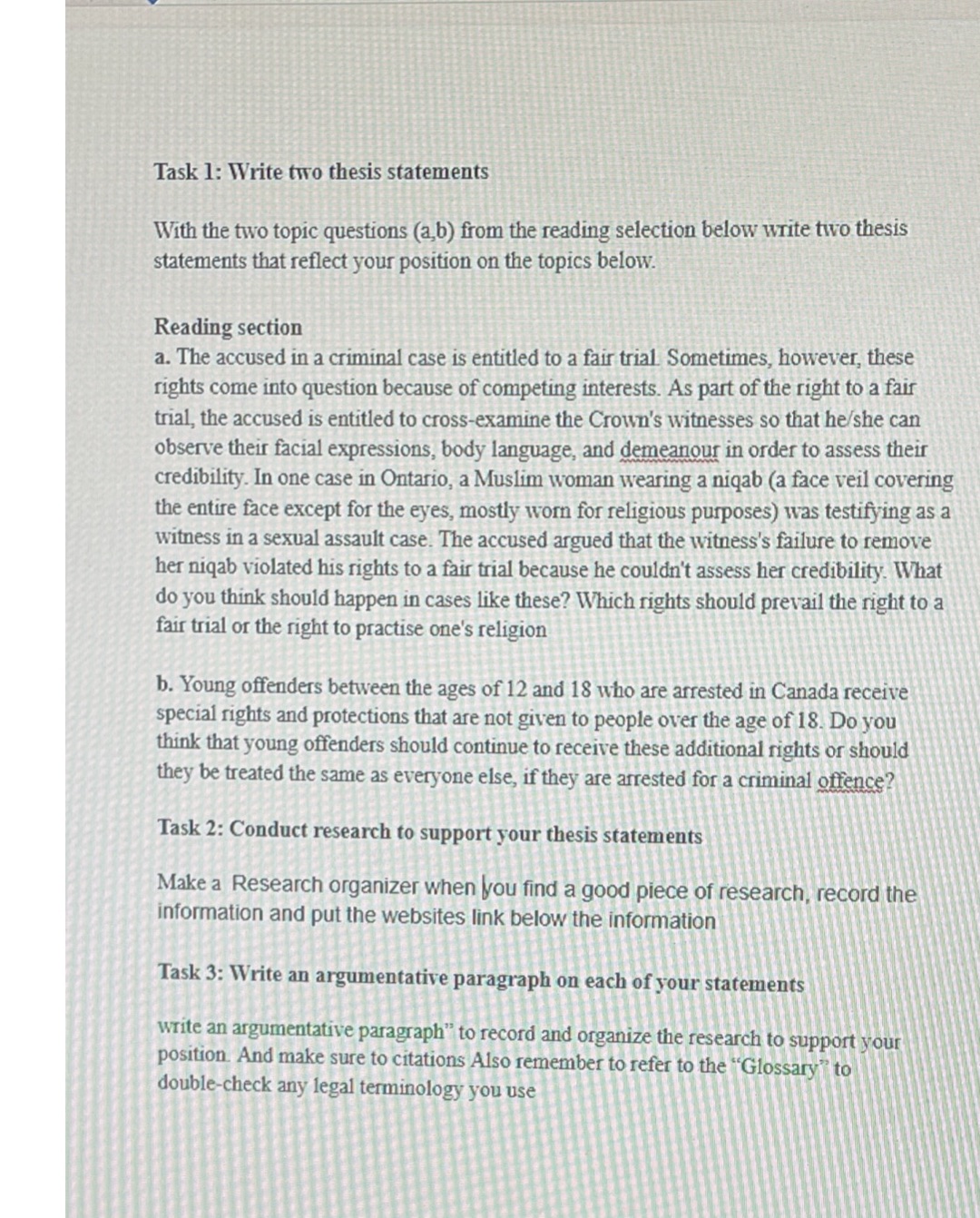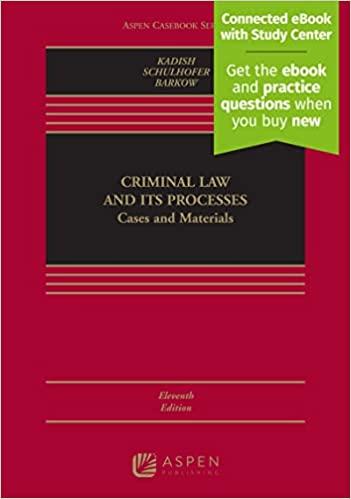Question
Task 1: Write two thesis statements Choose two of the topic questions from the reading selection based on several different issues that you have considered
Task 1: Write two thesis statements
Choose two of the topic questions from the reading selection based on several different issues that you have considered during this course and write thesis statements that reflect your position on the topics you have chosen. Note: In your answer, number them using the appropriate letters of the alphabet given in the reading selection, to indicate which two you have chosen.
a. The accused in a criminal case is entitled to a fair trial. Sometimes, however, these rights come into question because of competing interests. As part of the right to a fair trial, the accused is entitled to cross-examine the Crown's witnesses so that he/she can observe their facial expressions, body language, and demeanour in order to assess their credibility. In one case in Ontario, a Muslim woman wearing a niqab (a face veil covering the entire face except for the eyes, mostly worn for religious purposes) was testifying as a witness in a sexual assault case. The accused argued that the witness's failure to remove her niqab violated his rights to a fair trial because he couldn't assess her credibility. What do you think should happen in cases like these? Which rights should prevail the right to a fair trial or the right to practise one's religion?
b. Young offenders people between the ages of 12 and 18 who are arrested in Canada receive special rights and protections that are not given to people over the age of 18. Do you think that young offenders should continue to receive these additional rights or should they be treated the same as everyone else, if they are arrested for a criminal offence?
c. There is a debate within Canadian society about how people who have been convicted of serious criminal offences should be treated. Some individuals argue that the sentencing process should focus on rehabilitation, and that long prison sentences are ineffective in addressing the reasons why people commit crimes. Others believe that the sentencing process should focus on punishment and support the current federal government's view that serious crime should have serious consequences, including mandatory minimum sentences for certain crimes. How do you think that the law in Canada should treat people who are convicted of serious offences? Should the law focus on rehabilitating the offender and reintegrating him/her into society, or should it place the emphasis on punishment, involving lengthy prison sentences?
Task 2: Conduct research to support your thesis statements
record and organize the research by putting the website link under the information you recorded. Be sure to use credible sources.
Task 3: Write an argumentative paragraph on each of your statements
On each of your statements that you have chosen write a argumentative paragraph
 Task 1: Write two thesis statements With the two topic questions (a,b) from the reading selection below write two thesis statements that reflect your position on the topics below. Reading section a. The accused in a criminal case is entitled to a fair trial Sometimes, however, these rights come into question because of competing interests. As part of the right to a fair trial, the accused is entitled to cross-examine the Crown's witnesses so that he she can observe their facial expressions, body language, and demeanour in order to assess their credibility. In one case in Ontario, a Muslim woman wearing a niqab (a face veil covering the entire face except for the eyes, mostly worn for religious purposes) was testifying as a witness in a sexual assault case. The accused argued that the witness's failure to remove her niqab violated his rights to a fair trial because he couldn't assess her credibility. What do you think should happen in cases like these? Which rights should prevail the right to a fair trial or the right to practise one's religion b. Young offenders between the ages of 12 and 18 who are arrested in Canada receive special rights and protections that are not given to people over the age of 18. Do you think that young offenders should continue to receive these additional rights or should they be treated the same as everyone else, if they are arrested for a criminal offence? Task 2: Conduct research to support your thesis statements Make a Research organizer when you find a good piece of research, record the information and put the websites link below the information Task 3: Write an argumentative paragraph on each of your statements write an argumentative paragraph" to record and organize the research to support your position. And make sure to citations Also remember to refer to the "Glossary to double-check any legal terminology you use
Task 1: Write two thesis statements With the two topic questions (a,b) from the reading selection below write two thesis statements that reflect your position on the topics below. Reading section a. The accused in a criminal case is entitled to a fair trial Sometimes, however, these rights come into question because of competing interests. As part of the right to a fair trial, the accused is entitled to cross-examine the Crown's witnesses so that he she can observe their facial expressions, body language, and demeanour in order to assess their credibility. In one case in Ontario, a Muslim woman wearing a niqab (a face veil covering the entire face except for the eyes, mostly worn for religious purposes) was testifying as a witness in a sexual assault case. The accused argued that the witness's failure to remove her niqab violated his rights to a fair trial because he couldn't assess her credibility. What do you think should happen in cases like these? Which rights should prevail the right to a fair trial or the right to practise one's religion b. Young offenders between the ages of 12 and 18 who are arrested in Canada receive special rights and protections that are not given to people over the age of 18. Do you think that young offenders should continue to receive these additional rights or should they be treated the same as everyone else, if they are arrested for a criminal offence? Task 2: Conduct research to support your thesis statements Make a Research organizer when you find a good piece of research, record the information and put the websites link below the information Task 3: Write an argumentative paragraph on each of your statements write an argumentative paragraph" to record and organize the research to support your position. And make sure to citations Also remember to refer to the "Glossary to double-check any legal terminology you use Step by Step Solution
There are 3 Steps involved in it
Step: 1

Get Instant Access to Expert-Tailored Solutions
See step-by-step solutions with expert insights and AI powered tools for academic success
Step: 2

Step: 3

Ace Your Homework with AI
Get the answers you need in no time with our AI-driven, step-by-step assistance
Get Started


